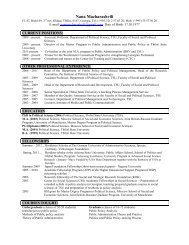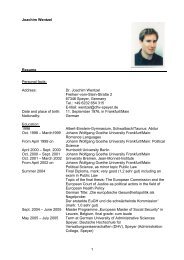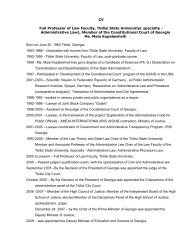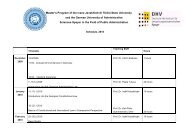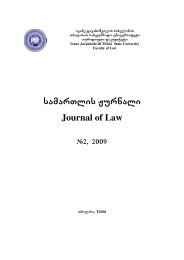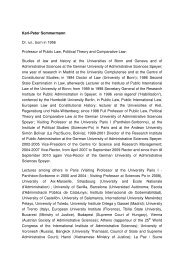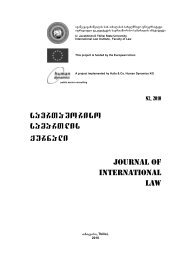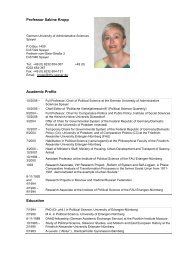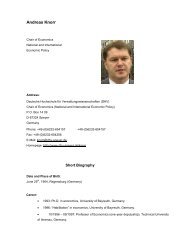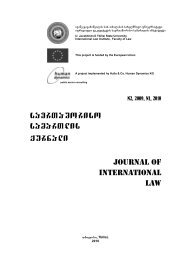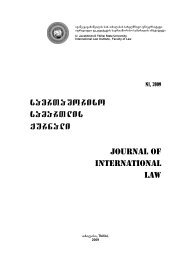Untitled
Untitled
Untitled
Create successful ePaper yourself
Turn your PDF publications into a flip-book with our unique Google optimized e-Paper software.
saerTaSoriso samarTlis Jurnali, #1, 2008 JOURNAL OF INTERNATIONAL LAW, N1, 2008<br />
bour forces with provisional requirement, which<br />
led to the migration of population from mountainous<br />
regions and especially from regions<br />
settled by ethnic minorities.<br />
Currently, hundreds of thousands of families<br />
are receiving living wage through labour<br />
migration, while the country receives solid<br />
amount through export of labour forces. 55<br />
The most important factor that determines<br />
the future potential of irregular migration from<br />
Georgia is social-economic development and<br />
the benefit that the population can have from<br />
any progress. If the living condition of majority<br />
of population remains in hardship, presumably<br />
irregular migration from Georgia will not reduce.<br />
56<br />
The most challenging task ahead for the<br />
Government of Georgia is to reduce the incentives<br />
to migrate abroad by improving the<br />
social-economic conditions of Georgian citizens.<br />
Internacional OrganizaTion for Migration (IOM)<br />
and other international organizations have shown<br />
a clear commitment to assist the Georgian government<br />
in accomplishing these tasks. 57<br />
Within last decades IOM important activities<br />
are: wide discussion of the laws of Georgia<br />
in the field of migration and promotion of<br />
their unification into common legislation, which<br />
shall ensure to regulate all aspects of migration.<br />
There in no civil inclusion practice in Georgia<br />
and very small number of people are behaving<br />
in this way. Instead deceived clients<br />
prefer to find justice themselves, they communicate<br />
with traffickers and employers themselves,<br />
put pressure on and request to return<br />
money. Sometimes people are not aware<br />
where to appeal and do not trust law enforcement<br />
bodies, such as police and prosecutors<br />
office.<br />
The legislative basis is as of yet insufficient,<br />
and the management structures and<br />
policy focus are not adequate enough to be<br />
able to take a firm stance against organizers<br />
of irregular migration, despite the fact that<br />
Georgia has signed almost all UN treaties regarding<br />
Human Rights. Some analysts claim<br />
that certain government officials have vested<br />
financial interests in the operation of tourism<br />
firms and employment mediators, which could<br />
serve as an explanation why so many organizers<br />
of irregular migration can still operate<br />
in virtual impunity in Georgia. 58<br />
Generally people in Georgia do not have<br />
any idea about the risks related to migration.<br />
Furthermore, government officials should<br />
be informed through seminars and symposiums<br />
on the definition, nature and incidence<br />
of irregular migration and trafficking. They<br />
should also be trained in determining what<br />
roles they can play in its prevention and control. 59<br />
This is an area where the Government of<br />
Georgia has to take the lead, assisted by the<br />
international community.<br />
CONCLUSION<br />
In 2005, the number of international migrants<br />
is between 185 and 192 million. 60 This<br />
represents approximately three per cent of the<br />
world population. Nearly all countries are concerned<br />
by migration, whether as sending, transit,<br />
or receiving countries. International migration<br />
has become an intrinsic feature of globalization.<br />
61 We need better understanding of<br />
the causes of international flows of people and<br />
their complex interrelationship with development.<br />
62 The plight of migrant workers and their<br />
families is one of those intractable issues in<br />
the field of human rights. In the current antiimmigration<br />
climate in many developed industrialized<br />
countries, economic migrants are often<br />
misunderstood. They are easy targets for<br />
politicians and the media in difficult economic<br />
times and are considered a threat to the host<br />
society, particularly those that enter the country<br />
of employment without authorization. Illegal<br />
migrants are frequently perceived as<br />
“scroungers” on the welfare state, as criminals,<br />
or as potential trouble-makers.<br />
Migration contributes to the transformation<br />
of contemporary economic and social relations.<br />
Labour migration plays a great role in<br />
the development of many countries in the<br />
world. Labour migration is an objective reality<br />
and despite its predominantly negative perception,<br />
this process yields more benefits than<br />
detriments. 63<br />
Although, lawyers have established international<br />
standards of human rights, but in order<br />
to implement them cooperation with politicians<br />
is very necessary. Because of certain<br />
reasons the States do not use the potential of<br />
international law. 64 Numbers of States including<br />
big States do not seek for rapid progress<br />
development, which has often been proved in<br />
practice. 65 It is also proved by the UN 10-year<br />
programme. Unfortunately it does not contain<br />
provisions improving realization of legal<br />
146



